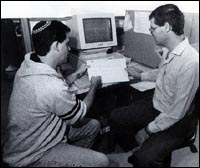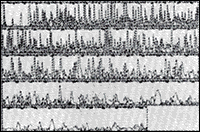
Israeli molecular biologists can now participate fully in the international quest to decipher the human genome, thanks to a $500,000 automated DNA Analysis Laboratory that opened last year at the Institute. The Human Genome Project, a 15-year multinational endeavor to sequence man's entire genetic storehouse, will make it possible to pinpoint the genetic origins of all five thousand human genetic diseases, hopefully leading to improved understanding of the function and formation of complex organs, including the brain.
Within the first six months of Laboratory operation, nearly all Institute molecular biologists had abandoned their own non-automated genetic sequencing procedures and started submitting samples to the new facility, which is part of the Institute's Biological Services Unit. Its expertise is also available to the wider Israeli scientific community.
According to Prof. Menachem Rubinstein of the Department of Molecular Genetics and Virology and Head of the Institute's Biological Services Unit, benefits have already been realized in Institute projects bearing on Down syndrome, human reproduction, the basis of odor detection, nerve repair and function, natural cancer protective mechanisms, and autoimmune diseases, among others.
DNA, the coded plan used by all living organisms to construct their various proteins, is a long chain-like molecule built from four different nucleotide bases tied together like a string of beads. The kingpin of the new Laboratory is a state-of-the-art DNA sequence analyzer, which accepts a gel loaded with as many as 36 different samples of specially prepared DNA and supplies a complete base sequence analysis in as little as eight hours.
Three other vital Laboratory components are soon to be added. One is a robot for liquid handling that will be able to automatically work up the DNA sample for insertion into the analyzer. The second component is a dedicated work station that will accumulate all data generated by the sequencer, reconstruct DNA chains too long to be handled by a single DNA analysis, and provide improved comparisons to known DNA sequences. The third instrument is a DNA fragment analyzer, which enables detection of genetic defects by separating, identifying and comparing large genetic segments.
Establishment of the automated sequencer facility was initiated by the Institute's Human Genome Committee, which supervises the Laboratory's integration into DNA-sequencing activities elsewhere. Its members are Profs. David Givol, Yoram Groner, Doron Lancet and Menachem Rubinstein. Equipping the Laboratory was made possible by a contribution from the Forchheimer Foundation and grants from the Planning and Budgeting Committee of the Israel Council for Higher Education and the Wolfson Family Charitable Trust.

